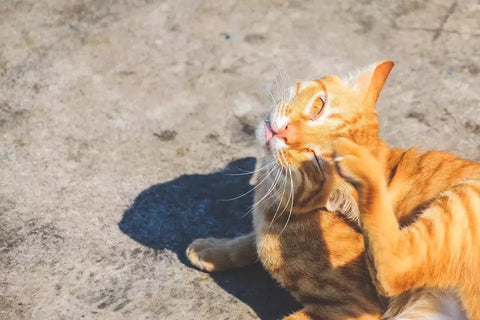Also known as OCD, this is not the type of OCD we all are familiar with. This is not about your dog constantly checking if his paws are clean or if his toys are in order. What we mean by OCD is Osteochondritis Dissecans, a painful joint disease that affects your dog's knees, shoulders, and elbows.
In this article, we'll help understand what you can do to handle this illness for your fur-baby.
Osteochondritis Dissecans: What Is It?
Osteochondritis Dissecans is a common joint disease that disturbs your fur-baby's joints and cartilage. Where two bones meet is what we call a joint. In the joint, there is a cover of cartilage that prevents the two bones from rubbing against each other and therefore creating smooth movements.
But in OCD, the cartilage fractures and can:
- create a cartilage flap that can't re-attach or;
- separate completely from the bone it is attached to
"This is not the type of OCD we all are familiar with. This is not about your dog constantly checking if his paws are clean or if his toys are in order. What we mean by OCD is Osteochondritis Dissecans, a painful joint disease that affects your dog's knees, shoulders, and elbows."
The detached and floating cartilage will keep on growing, resulting in irritated nerves and intense inflammation in the joints.
What Cause Osteochondritis Dissecans?
The causes of Osteochondritis Dissecans is still unknown up to this day. But some factors that predispose your fur-baby to develop this include:
- heredity
- genetics
- reduced blood flow to the cartilage or through the bone
- too much stress caused on bones (can be from lifting heavy weights, strenuous activities, etc)
- weight and obesity problems
- diet and nutrition
OCD is common in large-breed dogs but not all large dogs are vulnerable. Breeds that are prone include Bernese Mountain Dogs, German Shepherds, Great Danes, and Saint Bernards.
When is it an Emergency?
Recognizing OCD in your fur-baby is easy because you know when your fur-baby is acting normal. Common symptoms include:
- lameness (onset may be gradual to sudden and may also involve one or more limbs)
- lethargy
- movement hesitations
But OCD becomes an emergency with these symptoms:
- difficulty in walking
- limping
- lifting one leg when walking or favoring one leg when sitting or lying down
- intense swelling of elbows, shoulders or knees
- expression of pain when moving
Your vet will then perform exams like X-rays to make a proper diagnosis in your fur-baby's condition.

Managing a Dog with OCD
Living with a dog who has Osteochondritis Dissecans can present a challenge. Here are things you can do to manage your dog's condition:
Restrict stress and strenuous activities on affected areas. This means no running, no jumping, no romping, no sprinting. This should be properly observed at all times, even when just taking your dog for a walk. Control his activities when walking with a leash and just walk slow. Restricted activities are recommended until swelling stops or for at least 4 to 6 weeks and more therapeutic movements are encouraged after for a faster recovery.
Do not let your dog run freely on concrete surfaces. Letting your fur-baby run freely on hard and concrete surfaces increases great stress and force to the joints, worsening his condition.
Control your dog's weight. Obesity can worsen your dog's Osteochondritis Dissecans, it is best that you keep him within the normal range of your fur-baby's breed, also taking into consideration his lifestyle, age, size, etc. Learn more tips and tricks about managing obesity in your pup, here.
Balance out his nutrition. Being on top of your fur-baby's nutrition is a must. Balanced nutrition will help bring back the proper growth and function of your dog's bones, cartilage, and joints. This can be achieved by providing your dog a healthy diet prescribed by your veterinarian and some high-quality supplements that will improve joint health.
Preventative Measures
As pet parents, we know prevention is important. And even if the cause of OCD is still unclear, it's always a great idea to take extra precautions.
It is common knowledge that OCD affects your fur-baby's joints and cartilage and it makes so much sense that you should protect your pup's joints and cartilage to lessen his chances of developing OCD.
- Protect your fur-baby from any stress, impacts, injuries, probably from strenuous exercise, running, and playtimes. Take into account the breed of your dog and your dog's personality type. You know your pup the best!
- You have to see to it that your dog is just the right weight and not become obese.
- Promote healthy bone growth and keep bones strong through proper diet and nutrition can also help reduce your fur-baby chances of developing OCD.
What Can Pet Parents® Do?
Giving Pet Parents® Hip and Joint supplements to your dog who has Osteochondritis Dissecans and preventing Osteochondritis Dissecans can help promote healthy joints by establishing improved flexibility, reducing inflammation and strengthening your dog's cartilage and joints.
With the constant running and jumping your dog does every single day, giving him Pet Parents® Hip and Joint supplements daily can help lessen the risks of developing arthritis OCD as he grows.
These supplements have Glucosamine HCL, a compound that helps create a cushion around your fur-baby's joints, promoting flexibility & relief from pain & discomfort. Glucosamine supplements help alleviate the symptoms of joint damage by boosting the repair of the cartilage.
These also contain Chondroitin Sulfate (Porcine), a dominant substance that helps nourish tissues of joints, resulting in pain relief, boosted mobility, & improved ability to exercise. It helps promote water retention & elasticity in the cartilage, adequate shock absorption, and adequate nourishment of the tissues that line the joint.
Osteochondritis Dissecans before and after recovery can, in one way or another, restrict your dog's quality of life. But we, at Pet Parents®, want to help make sure that later in life your fur-baby can walk, run, play, and move easier. We want your pup to follow you everywhere on adventures with reduced joint pains.









